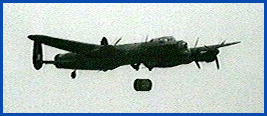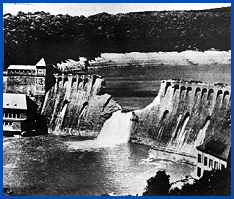
The Elan Valley dams
The Dambusters raid, 1943
Lancaster
bomber during
dropping trials,
1943
(far right)
The so called 'bouncing bomb' was actually a revolving depth charge, to be suspended in a belt-driven cradle beneath a Lancaster bomber. Resembling a large oil-drum, the bomb was to be set spinning in reverse before being dropped
 at
a height of just 60 feet and at a very precise speed and position
in front of the target dam.
at
a height of just 60 feet and at a very precise speed and position
in front of the target dam.The action of the device was to skip across the surface above the defensive netting until making contact with the face of the dam, and then roll down under the surface due to the spinning action of the mine. The depth charge was then intended to detonate underwater right beside the vertical dam wall.
The Eder dam
in the Ruhr Valley,
Germany
after the
Dambusters raid,
May 1943
The story of the Dambusters raid itself is well known, and
the story here is mainly concerned with the Elan Valley connection.
The last stage in the sequence of events, however, was that 19
specially equipped Lancaster bombers of 617 Squadron, RAF led
by Wing Commander Guy Gibson took off from Scampton in Lincolnshire, England on the night of May 16th/17th, 1943
headed for the Ruhr Valley.
in Lincolnshire, England on the night of May 16th/17th, 1943
headed for the Ruhr Valley.
The mission was an exceptionally risky one because of the heavy
underslung payload beneath the bombers and the need to approach
the targets at a very low altitude exposed to heavy defensive
ground fire. The Mohne and Eder dams were breached in the attacks,
and the Sorpe dam was damaged.
Eight of the 19 aircraft failed to return, and 53 of 133 aircrew
were killed in the operation. The outstanding bravery of those
involved was recognised by the number of medals awarded, including
the Victoria Cross presented to Guy Gibson.
There are 4 pages on the Dambusters connection. Use the box links below to view the other pages.